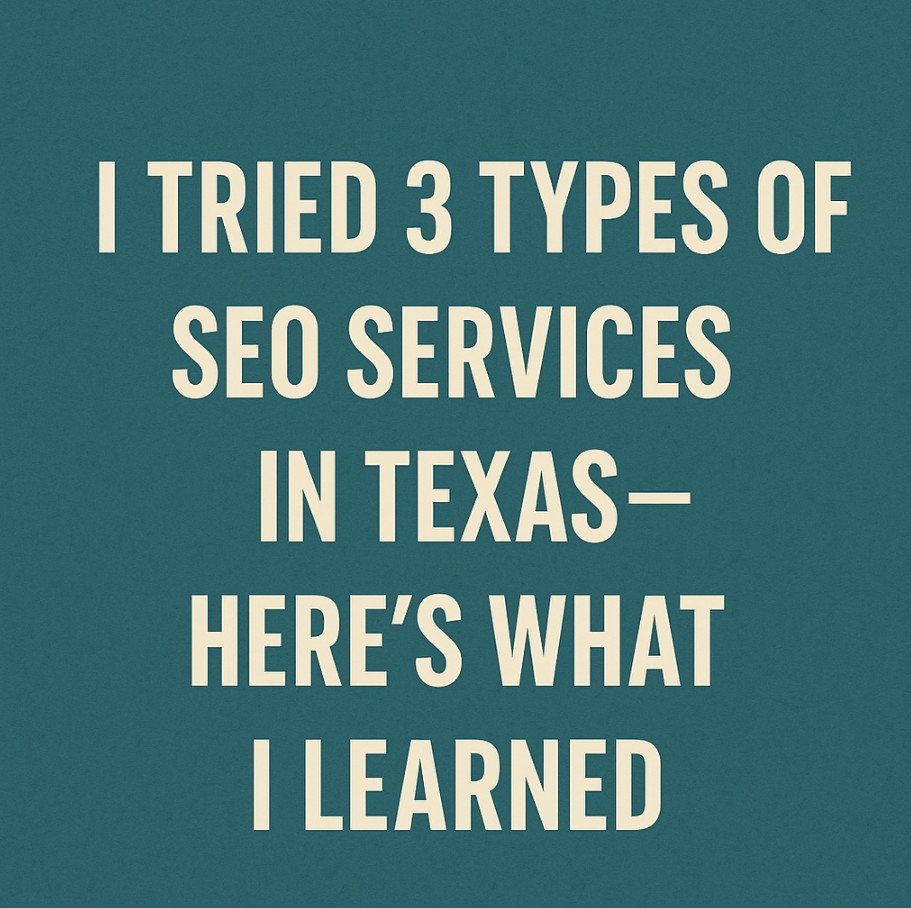When I first set out to improve my website’s online visibility, I had no idea how overwhelming the world of SEO services could be. As a small business owner in Texas, I was eager to partner with professionals who could help me get ahead in the digital space. I decided to experiment with three different types of SEO services commonly offered in the state: local SEO agencies, freelance SEO consultants, and big digital marketing firms that offer SEO as part of a package. This blog post is a detailed breakdown of my experience, what worked, what didn’t, and what I would recommend to others looking to invest in SEO in Texas.
Why I Decided to Try Multiple SEO Services
Like many entrepreneurs, I started with some basic SEO knowledge but quickly realized that real results would require expert help. Texas, with its booming economy and diverse business landscape, is home to hundreds of SEO providers. I wanted to understand not just what they offered, but what actually worked in practice. That’s when I decided to commit three months to each type of provider. My goal? To see who could give me the best results — not just in rankings, but in real business impact.
The Three Types of SEO Services I Tried
1. Local SEO Agencies
Local SEO agencies in Texas tend to focus on small to mid-sized businesses operating in specific cities or regions. I worked with a well-known agency based in Austin. Their pitch was all about dominating local search — maps listings, local citations, reviews, and optimizing Google Business Profile (formerly Google My Business).
2. Freelance SEO Consultants
Next, I hired a freelance SEO consultant from Dallas who had great reviews on Upwork and a portfolio that included work for small ecommerce sites and service providers. Freelancers often promise flexibility and personalized attention, and I wanted to see if that could translate to measurable results.
3. Big Digital Marketing Firms
Finally, I engaged with a large digital marketing company headquartered in Houston that offered SEO as part of a broader suite of services — including paid ads, social media marketing, and content creation. Their pitch was about synergy: how SEO would fit into a wider digital strategy.
My Goals and Metrics
For all three providers, I kept the goals consistent:
- Increase organic traffic by at least 30% over three months.
- Improve rankings for 10 primary keywords related to my niche.
- Boost qualified leads via my website’s contact form.
- Improve Google Business Profile engagement (for local searches).
I tracked everything using Google Analytics, Google Search Console, and my CRM system.
The Process: What Each Service Did
Local SEO Agency
The Austin agency began with an audit of my website and Google Business Profile. Their main tactics included:
- Claiming and cleaning up directory listings.
- Generating local citations on sites like Yelp, BBB, and Angie’s List.
- Encouraging me to request reviews from customers.
- Creating geo-targeted landing pages for my key services.
- Optimizing my Google Business Profile with posts, photos, and Q&A.
They also ran a local link-building campaign focused on Texas-based blogs and news sites.
Freelance SEO Consultant
The freelancer offered a more personalized plan:
- A deep-dive technical audit and on-page SEO fixes (title tags, meta descriptions, H1 tags).
- Improving internal linking for better crawlability.
- Keyword research focused on long-tail variations I hadn’t considered.
- A small-scale content plan: two new blog posts per month.
- Basic backlink outreach — mostly through guest posts on small blogs.
The freelancer communicated frequently and was open to adapting tactics based on weekly data.
Big Digital Marketing Firm
The large firm’s process was less focused on SEO alone:
- SEO was part of a multi-pronged strategy that included PPC, social media, and content marketing.
- They optimized my website’s structure and added schema markup.
- Content marketing involved creating large “pillar” pages meant to target broad topics.
- Link building was outsourced to another firm they partnered with.
- They provided a slick dashboard where I could monitor progress on all campaigns at once.
The communication was more formal, with monthly calls and polished reports.
Results After Three Months With Each
Local SEO Agency: The Good, The Bad, The Meh
What worked:
My Google Business Profile views increased by 40%. I ranked in the top 3 for two key local terms — including “[my service] in Austin.” I also received 18 new reviews (up from just 3).
What didn’t:
The increase in organic website traffic was modest: just 15%. Most of the new leads came via calls from the Google Business Profile rather than contact forms on the website. The local citations were useful, but the link-building campaign barely moved the needle.
What I learned:
Local SEO agencies are fantastic for businesses that rely heavily on foot traffic or local service areas. If your business model depends on being found on Google Maps, this route can pay off. But for broader organic traffic and national reach, local agencies may have limitations.
Freelance SEO Consultant: The Good, The Bad, The Meh
What worked:
The freelance consultant helped my site’s technical health a lot. Page speed improved, broken links were fixed, and internal linking was much better. Organic traffic increased by 25%, and the blog posts started ranking for some long-tail keywords, bringing in small but meaningful traffic.
What didn’t:
Backlink acquisition was slow. The guest posts didn’t generate high-authority links, and outreach efforts were limited by the freelancer’s bandwidth. The lack of scale meant that growth plateaued towards the end of the three months.
What I learned:
Freelancers are great if you want hands-on attention and customized plans. They’re particularly strong for technical fixes and content strategy. However, without resources for large-scale link building or advanced tools, their impact can be slower.
Big Digital Marketing Firm: The Good, The Bad, The Meh
What worked:
Organic traffic increased by 35% — the highest of all three. The comprehensive content strategy helped my site rank for broader, competitive keywords. I also got exposure across other channels (PPC and social) that indirectly supported SEO.
What didn’t:
SEO felt like just one piece of their puzzle. I often felt like a small fish in a big pond, with less attention on my specific SEO needs. The link building they outsourced produced mixed results — some links were irrelevant or low quality. Also, the price was significantly higher than the other two options.
What I learned:
Big firms can deliver results, but they might not be ideal if you want SEO-specific focus. You’re often paying for the whole package, so it works best if you’re ready to invest in a full digital marketing suite.
Cost Comparison
- Local SEO agency: Around $1,500/month
- Freelance SEO consultant: Around $1,000/month
- Big digital marketing firm: Around $3,500/month (SEO was about 40% of this cost)
My Takeaways: What I’d Recommend
After nearly a year of experimenting, here’s what I’d tell anyone considering SEO services in Texas:
If You’re a Local Service Business…
Go for a local SEO agency. They know the market, understand local search, and can get you into the map pack where it matters. Just know their strengths are regional, not national.
If You’re on a Budget or Want Flexibility…
Hire a freelance SEO consultant. You’ll get someone who listens, adapts, and works closely with you. Just be patient with growth, and consider pairing them with another service (like a separate link-building agency).
If You Have the Budget and Want a Full Digital Push…
Consider a big marketing firm. But be clear in setting expectations about how much focus you want on SEO. Make sure they aren’t just adding it as an afterthought to other services.
The Big Lesson: SEO Isn’t One-Size-Fits-All
One of the most important things I learned is that SEO isn’t magic, and no provider will deliver overnight results. Texas is a competitive landscape, whether you’re in Dallas, Houston, Austin, or smaller cities. You have to think carefully about your business model, your goals, and your budget before choosing a service provider.
I also learned that transparency, communication, and reporting are crucial. The freelancer won here — I always knew what was happening. The big firm dazzled with data but sometimes lacked detail. The local agency was in-between.
Final Thoughts
If I had to do it again, I might actually combine services. A local SEO agency for Google Business Profile and citations, a freelancer for technical and content work, and (when the budget allows) a larger firm for big content campaigns and multi-channel synergy.
SEO is a long game. No matter which type of provider you choose in Texas, be prepared to commit time, effort, and resources. And above all, stay involved. The best SEO results came when I worked closely with my providers, asked questions, and kept learning myself.

















